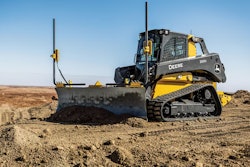Natasha Kieswetter has a bird’s eye view of operations at Kieswetter Excavating in Heidelberg, Ontario. A large window overlooks the firm’s gravel pit, letting Natasha keep an eye on the trucks going in and out of the quarry. With the company for more than 10 years, Natasha runs dispatch and oversees the firm’s fleet. She also performs much of the office work.
As Roger Kieswetter’s daughter, Natasha is the fourth generation of Kieswetters involved in either construction or aggregates. But it doesn’t stop there. Roger’s son Lee first started in the company by performing quality control for the company’s aggregate division. After completing a business degree he rejoined the company and now also handles estimating and job supervision. And Roger’s youngest son Clay, although still in high school, has put in hours in both the office and the field.
“My children’s involvement in the company allows us to be comfortable about acquiring more work,” Roger says.
“Go into dispatching”
Roger himself entered the family business at 18 at the urging of an uncle. “He told me to forget university and go into dispatching,” he says. “He felt I’d learn more. And looking back, I’m glad I made that decision.”
In one way, Roger’s involvement with the company firm could be seen as a given. His grandfather, John Keiswetter Sr. started the firm in the 1930s, delivering coal and gravel by horse and buggy. By the time John’s six sons bought him out in the 1950s – and yes, all six were in the business – the company had solid earthmoving credentials.
But Roger had higher ambitions than the dispatch desk. On nights and weekends, he used a small dozer he’d bought from his father and pushed dirt for other contractors. Eventually, he departed, forming Rockway Excavating. Roger came back in 1981 when he and a cousin bought the family business. The firm then added demolition to its skill set.
When Roger and his cousin split the business in 2001, Roger began the task of re-establishing the Kieswetter name in the excavation business. “I maintained the staff and equipment we had on hand with the former company,” he says. He didn’t start buying equipment until his second year in business, but has purchased machines steadily since then, and within five years doubled his equipment fleet to 30 machines.
Equipment isn’t the only thing that doubled. The company now has about 35 employees, up from 13 in 2001.
Simple philosophy
Roger works on a simple philosophy: build up a repeat client base with pricing and workmanship. It’s helped him grow his company to a $4.7 million operation in 2006.
Kieswetter Excavating clients include general contractor Melloul-Blamey Construction, Waterloo, Ontario, which subcontracts with Kieswetter to site develop industrial, institutional and private sector building projects. Another is Canada’s Home Hardware chain, which is headquartered in nearby St. Jacobs, Ontario. The company works on a variety of projects for Home Hardware, including parking lots, retention ponds, underground storage and excavation. It doesn’t do any public sector work, however. “This is enough to keep us hopping,” Roger says.
“The fact is, he performs,” says Jeff Shantz, owner, Melloul-Blamey Construction. “He’s a forward-thinking guy, and he’s bringing in the younger generation.”
Along with the firm’s other clients, these two customers keep the company busy within a 20-mile radius of its home in Heidelberg, Ontario, where the horse and buggies of Old Order Mennonites are a common sight.
It’s an area with economic blessings; Roger estimates the last hard recession was in 1990. The region’s diversified underpinnings include the University of Waterloo and Research in Motion, creators of the Blackberry.
Roger’s previous firm was hit hard by the 1990 recession, though. The firm went from 100 to 25 employees and sold 60 percent of its equipment. This has made him aware of how flexible his firm needs to be. “We basically started all over again,” he comments. “You can’t just sit there and hope something’s going to change. You have to deal with it.”
Hands-on operation
Kieswetter Excavating relies on its operators to do the lion’s share of preventive maintenance. “Most of my employees are long term, so they know the program,” Roger says. He gives a half-hours pay each day to each operator to service their machines. He likes the system so much he’d be hesitant to have a dealer take over even if the price were right. “It would change the work habits of my operators,” he says. “Right now, they know they’re responsible for that machine. If they know they don’t need to grease, then they won’t look for cracks and leaks.”
And he doesn’t swap operators and machines. Once an operator is assigned, he stays with that machine, which Roger contends is another key to his equipment’s longevity. “Basically, it’s the operator’s machine,” he says. “And it gives him a better feeling about his position in the company.”
Kieswetter Excavating’s fleet includes excavators, loaders, dozers, a screening plant and impact crusher.
While Roger hires a great deal of his trucking out – at least six trucks per day – he does have a core fleet of four tri-axles, including two dumps and two with roll-off interchangeable bodies. “I hire so much because I’d never be able to have the right amount of trucks,” he says. “Some days you don’t need any; but others you need as many as 15. Trucks can be a necessary evil.”
Maybe, but his fleet trucks serve as the perfect rolling billboard for Keiswetter Excavating’s distinctive red-and-yellow color scheme. “Just by seeing these colors, people know they’ve just passed one of our trucks,” he says.
“He’s image conscious,” says Harry Cosford, owner of Swiss Hills Landscaping, St. Jacobs, Ontario. “He works smart and has a wealth of knowledge. Operators who started with his dad are still with him.”
Diversified operation
While the quarry primarily supplies gravel for company projects, Kieswetter Excavating also has an aggregate supply agreement with the city of Waterloo. The quarry also supplies specialty sand and aggregate to Tri-City Ready Mix, an independent company that shares their 30,000-square-foot building, plus several paving and excavating companies.
Kieswetter Excavating’s environmental division collects, crushes and reuses recycled asphalt, concrete, brick and block. The firm’s roll-off bin service collects construction waste on jobsites throughout the area. Site remediation services include removal of underground fuel tanks and contaminated soil removal.
Like many contractors in northern climes, Roger spends winters doing snow removal. “This gives my men, many who have been with me for years, year-round employment,” he says. “We’ve also been fortunate enough to pick up work in the fall that carries us through the winter.” Even in bitterly cold weather, his crews continue to work, using rippers to dig out the frost. “It’s actually better to put in parking lots with frost on the ground, especially if the alternative is mud,” he comments.
Roger usually leaves his excavators on site in the winter. “My loaders, however, are either plugged in or inside the shop, as are my trucks,” he comments. “It saves money when you don’t have to warm them up as much, nor do you have the electrical and air brake problems you would have if you were parked onsite.”
Having fun
But don’t forget it’s not all hard work. Roger gets out in the field every day. “I love the dirt business and equipment,” he says. “I love being around my operators and customers. Actually, we’re out there having fun.”









